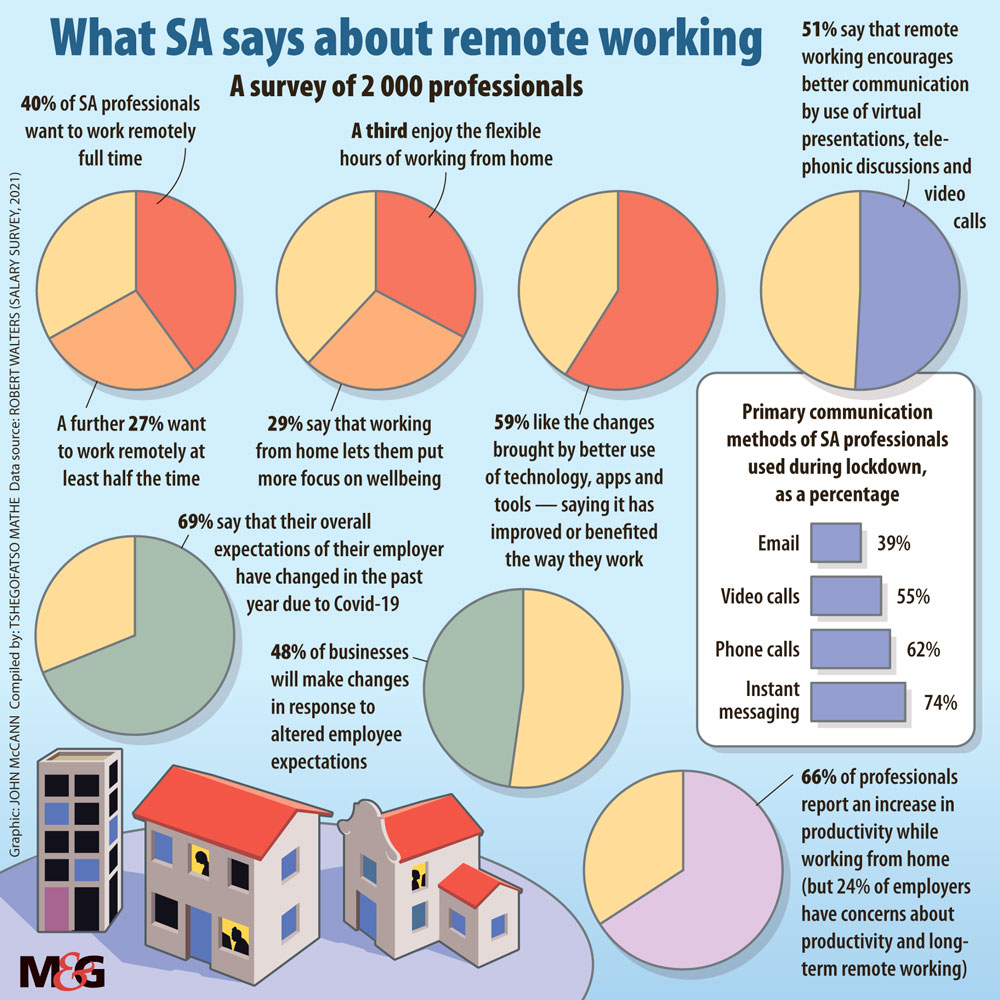Pros, cons: Working from home means more time with family, but many women also do house and child care. Photo: Grant Squibb/Cultura Creative
About 40% of South Africa’s senior professionals — people working in managerial positions across sectors such as operations, financial services and legal — want to move to full-time remote work. This is according to data from a salary survey of 2 000 white-collar professionals conducted by Robert Walters, a global recruitment consultancy.
Samantha-Jane Gravett, an associate director at Robert Walters Africa, said that 2020 was the year of the world’s largest remote working experiment. “Employers would be amiss to think that there wouldn’t be some long-term changes to employee expectations as a result.”
She said the Covid-19 pandemic did not necessarily herald an entirely new work style, but it certainly “fast-tracked the inevitable around flexible working, speeding the transition up by as much as five to 10 years for some companies”.
But not everyone can work from home. Jahni de Villiers, an industrial and labour relations specialist, said being able to work from home depends on the workplace. She said employers needed to do proper risk assessments and determine who should be in the office and when. “It’s important that employers creatively think about this,” she said, adding that in sectors such as retail, farming and manufacturing, employees needed to be on-site.

Employees who can work from home have reported benefits such as a better work-life balance and less commuting stress. But there has also been a downside — employees are working longer hours. Others reported being distracted by family members and, with families spending more time at home together, there has been an escalation in gender-based violence.
De Villiers said some employees do not have set start and end times to their working days. “It’s nice to be able to attend meetings in your pyjamas, but in reality, you are online and available whenever you are awake, which isn’t healthy.”
According to the Robert Walters survey, 66% of professionals reported an increase in productivity when people worked from home, while 24% said employee productivity was a key barrier to long-term remote working.
According to the data, 29% of professionals said they enjoyed the flexible hours afforded by working at home. Almost a third said that working from home had allowed for an increased focus on wellbeing and 35% found the more regular updates and check-in calls from managers and colleagues during lockdown to be a positive change to their work environment.
But not everyone has the same experiences. De Villiers said that mothers who work have to shoulder a disproportionate burden of caring for children full-time while also working full-time. She said the effects of this would linger. Similarly, “people who have been in lockdown alone are lonely. Balance is an illusion, and we are all just trying to do our best,” she said.
It’s nice to [work] in your pyjamas, but in reality, you are online and available whenever you are awake…
There needs to be a clear distinction between work and life outside of work, with proper boundaries in place, says De Villiers. She suggests employees consider “fake commuting”, which is a substitute for the “me time” commuters once had on their way to their offices.
Selby Mthokozisi, an attorney for the Casual Workers’ Advice Office, says regardless of the small gains that came with the work-from-home trend accelerated by Covid-19, there have also been severe disadvantages.
He said women subsidise many home maintenance costs by doing household jobs such as laundry and cooking for free, and are now having to work at home professionally too. He added that it was time certain home-related costs were covered by employers.
“Working from home benefits the employer and capitalism more than the employees, because the employer can now maximise profits by having labour that does not need lunch breaks, does not waste time commuting, and uses their own wi-fi (in certain instances).”
Most employers paid “meagre” wages to the working class and “this might be an opportunity for the fight for higher wages to be realised finally. If workers are to work from home, costs that will reduce productivity such as laundry, cooking and baby-sitting must be covered by the employer,” Mthokozisi said.
De Villiers disagreed, saying the rule was employers needed to provide the tools of the trade so employees could work at home.
“I wish this included coffee, but it does not,” she added.
The survey found that 48% of businesses are considering changing their offering to match their employees’ expectations. At the top of the employers’ list is looking to reduce or reconfigure offices, enhance mental health and wellbeing policies and increase their investment in technology tools.
Gravett said: “Employees who are hoping for full-time remote working are unlikely to get their wish, with a quarter of companies stating that their traditional senior leadership team will be a key barrier to this — with many still preferring a ‘bums on seats’ approach to white-collar working.”
Tshegofatso Mathe is an Adamela Trust business reporter at the M&G